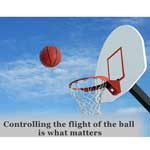“You can practice shooting eight hours a day, but if your technique is wrong, then all you become is very good at shooting the wrong way. Get the fundamentals down and the level of everything you do will rise.” – Michael Jordan
 Basketball psychology is partly about helping an athlete becoming self-aware of thought patterns and behaviours that are harming their performance. This requires an athlete to be completely honest with both themselves and their sports psychologist for basketball before any positive tweaking of their performance and mental game can commence.
Basketball psychology is partly about helping an athlete becoming self-aware of thought patterns and behaviours that are harming their performance. This requires an athlete to be completely honest with both themselves and their sports psychologist for basketball before any positive tweaking of their performance and mental game can commence.
One of the reoccurring themes frequently unearthed during my time spent with athletes, coaches and even the parents of athletes is that of wasting energy (physical and mental) on the “uncontrollables”. This tends to weaken an athlete’s basketball mental toughness. By focusing on the inappropriate it will have the undesired knock on effects of sapping energy as well as distorting performance potential.
In terms of sports psychology for basketball, “uncontrollabes” are defined as being all the factors that an athlete cannot possibly control. Many athletes who are clearly talented and perform well when training struggle to perform to their full potential during competition.
Following the right questions and guidance, athletes can achieve introspection. Some of the issues that they eventually become aware of are anxiety, fear and worry. All of which cause them to perform tentatively at best come game time.
By delving further into the athlete’s psyche these negative emotions can be directly linked with their own personal and specific triggers. Quite often athletes’ state that they are focusing on the end result, the other team, bad calls from referees, “toxic” teammates, the fans, etc.
The list is almost inexhaustible; however they all have one thing in common. That is, the athlete is spending too much time and exerting too much energy by focusing on, and then worrying about, things that are beyond their control on the court. Ultimately, all these things cannot positively impact their own performance or their team’s overall game.
To harness the benefits associated with a strong mental game, basketball players must focus only on the things that can actually have a positive impact for them and their team. This can be achieved through being taught to focus on such things as their technique, executing the play correctly, supporting their teammates, preparation, fitness, focus, effort, attitude, having no expectations, etc.
The notion of having no expectations is always the most challenging idea to teach, but even partial comprehension of it can lead to success. The no expectations approach is contrary to what most coaches and teams believe in; all it means is that an athlete approaches every game with no preconceived notion of what will be accomplished.
To help in understanding this concept, think of your own expectations when facing an opposition that you have always dominated in the past. If you believe you will dominate prior to the game and then, come game time, find yourself in the unfamiliar situation of being behind, you may start doubting yourself and even become flustered. This can lead to a severe dip in composure and performance.
It’s always best to tackle any situation by training to focus only on the things in an athlete’s personal and immediate control. This is one of the keys to developing maximum composure and basketball mental toughness.
*Download the free mental game assessment and get started on Improving your Mental Game in basketball
